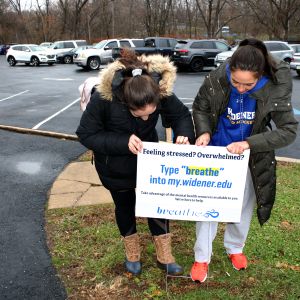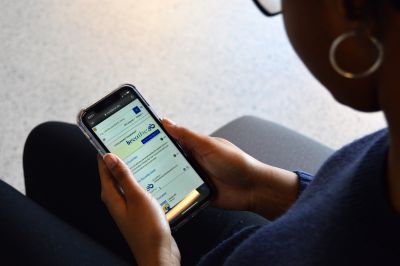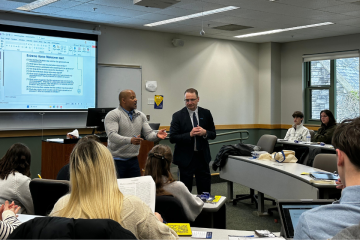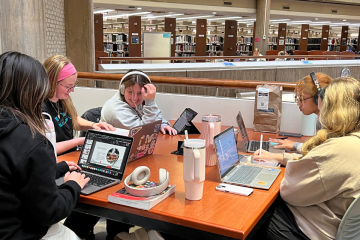Students Lead New Mental Health Resource on Campus

Two Widener students have used their summer research projects to build a new way to access potentially life-saving mental health resources on campus.
Michaela Kolenkiewicz, a senior psychology major with a dual minor in French and sociology, and Christiana Dunn, a junior communication studies major with a concentration in public relations and advertising, transformed their research into a useful digital tool with the launch of the campus-wide “Breathe” campaign.
“We are trying to give everyone more access to mental health resources,” Kolenkiewicz said. “We want resources to be at people’s fingertips. You can go on myWidener on your phone and type in “Breathe” and get the suicide hotline and click ‘call’ and call right away. It’s a really great resource.”
Faculty mentor, Dr. Angela Corbo, associate professor and chair of communication studies, advised the students as they researched the promotion of mental health services on college campuses. They looked at a number of different services individually before deciding on a combined focus that led to the Breathe campaign.
Dunn specialized her work on athletes and NCAA requirements for mental health services in Division I and II schools. The research inspired her to provide student athletes at Widener, a Division III school with different NCAA requirements, easy access to campus mental health services.
Kolenkiewicz started her project by looking at how suicide is discussed on social media, which led her to consider ways students seek help online. That inspired her to build on the university’s new myWidener digital tool, hosted through the university website. Her interest in enhancing the resources available through myWidener led her to partner first with Dunn, and then with Widener’s Information Technology Services, or ITS.
Together, the group developed the myWidener platform linking mental health resources into one area.
When people type “breathe” into myWidener, a linked list of resources appears, providing access to the national suicide hotline, Widener counseling services, campus emergency services, health and wellness resources, academic support services, Title IX contacts, and more.
We’re giving better access to the resources on campus so people can now utilize myWidener when they need to reach out and ask for help.” — Michaela Kolenkiewicz.
Kolenkiewicz and Dunn started with two different research goals but were able to weave them together under the Breathe campaign. Widener gave them the direct access to resources and administrative connections that made their research projects outstanding educational experiences. Faculty mentorship and feedback, and support from partners in ITS, helped them build problem-solving skills that will be valuable assets when they begin careers.
Corbo said the myWidener platform was the ideal portal for this information, and ITS staff helped the students connect that technology with existing resources on the Widener website.
“The students and I are incredibly grateful for the campus support on this project,” Corbo said, noting initiatives like this boost students’ confidence with, and competence in, research processes. “Undergraduate research is a transformational experience for students.”
The students placed signs around campus to raise awareness about the new resource, and sponsored several stress-buster events. They hope to continue with the promotion of mental health services in 2020.
“We want this not to just be for the students, but for the faculty too,” Dunn said. “We want this to be for the entire campus. Not just for student athletes or the student body, but the entire Widener community.”





